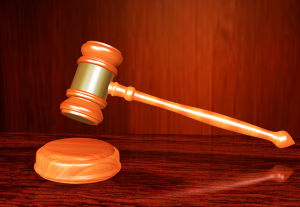 In years past police officers had almost no other option but to arrest an individual observed committing a crime. This was true with respect to Maryland state cases and federal cases, but over the years the system has evolved to where a police officer can now charge a person with a crime without having to waste hours transporting and booking that person. When you think of federal crimes the first things that come to mind are complex criminal conspiracies like fraud and bribery (such as the recent college basketball recruiting scandal) or big time drug trafficking cases, but not all federal criminal cases are worthy of news headlines. The big cases technically could be handled by local and state law enforcement agencies because they usually occur on state property where state agencies have jurisdiction, but the Feds have their pick due to their vast resources. Federal ticket cases though are petty offenses that actually occur on federal property, where the only cops that have jurisdiction are the ones employed by the U.S. government. In essence, it is not the actual offense that makes the cases federal, but where the offense occurred.
In years past police officers had almost no other option but to arrest an individual observed committing a crime. This was true with respect to Maryland state cases and federal cases, but over the years the system has evolved to where a police officer can now charge a person with a crime without having to waste hours transporting and booking that person. When you think of federal crimes the first things that come to mind are complex criminal conspiracies like fraud and bribery (such as the recent college basketball recruiting scandal) or big time drug trafficking cases, but not all federal criminal cases are worthy of news headlines. The big cases technically could be handled by local and state law enforcement agencies because they usually occur on state property where state agencies have jurisdiction, but the Feds have their pick due to their vast resources. Federal ticket cases though are petty offenses that actually occur on federal property, where the only cops that have jurisdiction are the ones employed by the U.S. government. In essence, it is not the actual offense that makes the cases federal, but where the offense occurred.
Common state offenses where an officer may issue a citation and release the individual include shoplifting, possession of marijuana and trespassing. After the officer issues a citation the individual will be sent on their way, and told to check their mail for a court notice from the district court. For the most part federal tickets proceed in the same manner, but there are literally hundreds of different petty offenses that may result in a federal police officer issuing a ticket. Another difference is that all federal tickets are processed by one agency called the Central Violations Bureau or CVB. The CVB is the agency that notifies the federal district courts in Baltimore, Greenbelt or Salisbury to set must appear tickets for initial appearance and then trial, and is also the agency that processes the payment of fines.
The state of Maryland contains dozens of areas that are owned by the U.S. government and therefore policed by federal law enforcement agencies. These include Fort Meade, Joint Base Andrews, Aberdeen Proving Ground, NSA, Veteran Affairs medical centers and the NIH (National Institutes of Health). There are also numerous federal highways within the state such as the Baltimore Washington Parkway (295) and the Clara Barton Parkway and national parks such as Assateague National Seashore. All offenses committed in these areas, no matter how minor, must be handled in federal court and mandatory appearance tickets will be heard in front of a United States Magistrate Judge. If you are given probation you will be supervised by the U.S. Probation and Pretrial Services System and if you get a fine you must pay the CVB directly. There is a chance that your case may be resolved without paying a fine or receiving probation or jail time, but this must be pursuant to an agreement with a prosecutor from the U.S. Attorney’s Office.
In sum, a federal ticket should be treated in the same manor as a state ticket and should be handled with the help of an attorney. The one major difference between state and federal tickets is that officers in federal tickets show up for their cases, and if they don’t they will have a reason. Do not go to federal court expecting a chance of having your case dropped because the officer didn’t show, as this simply does not happen. Overall the criminal citation system has benefitted individuals charged with minor crimes because they can avoid being arrested and sitting in jail until being seen by a judicial officer. On the contrary though, police officers may be more likely to initiate criminal charges rather than give an offender a stern warning. An officer can issue a criminal citation in minutes rather than spend a large portion of his or her day writing up paperwork for a minor offense. If you received a federal ticket and have a question or would like to inquire about hiring an attorney feel free to call federal criminal lawyer Benjamin Herbst at 410-207-2598.
 Criminal Defense Lawyer Blog
Criminal Defense Lawyer Blog

